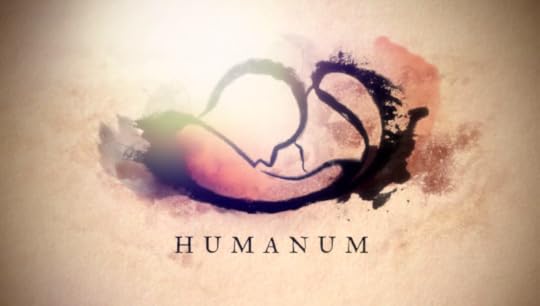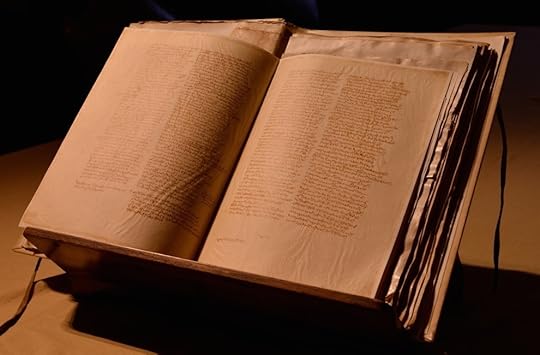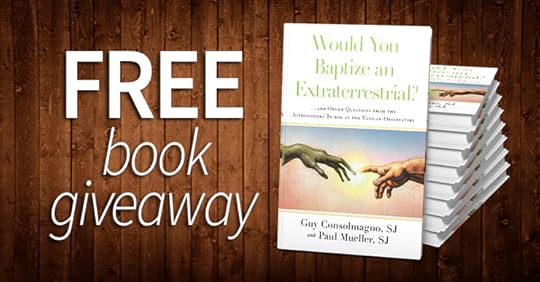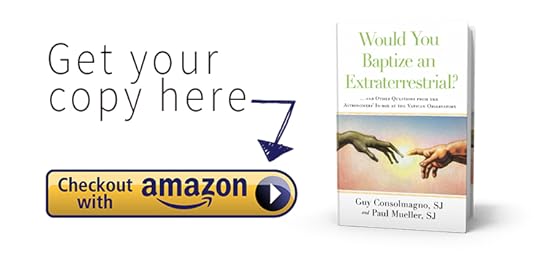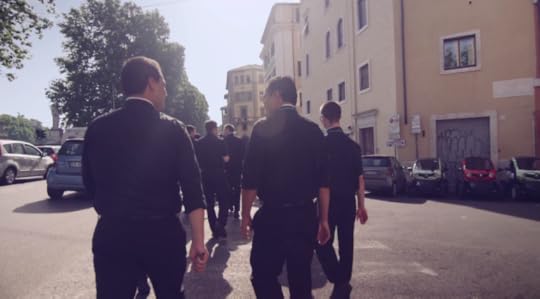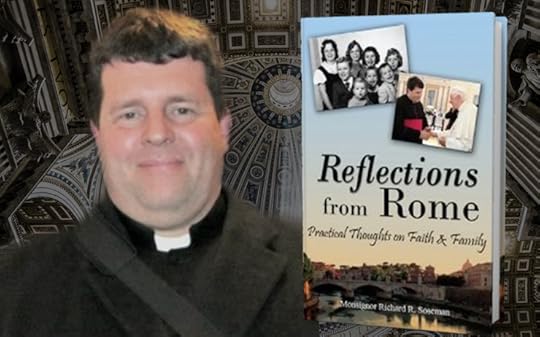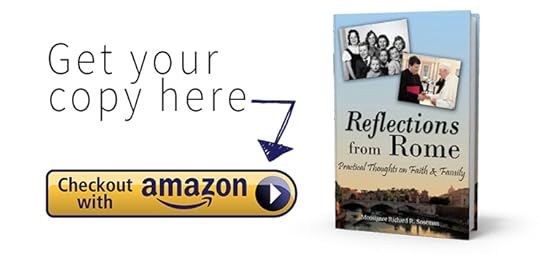Brandon Vogt's Blog, page 22
November 5, 2014
The Pope’s “Humanum” Conference: An Interview with Dr. Helen Alvaré
Many Christians are buzzing about an exciting new conference that will be held at the Vatican from November 17-19. It’s called “Humanum” and it will bring together dozens of religious leaders from around the world—including several Protestant, Jewish, and Muslim leaders—to discuss the meaning of marriage, specifically its grounding on the complementarity of man and woman.
Here’s a beautiful video trailer for the event, featuring the voice of Dr. Peter Kreeft:
If you can’t see this video in your RSS reader or email, then click here.
Pope Francis himself will kick off the “Humanum” conference with a special address. Attendees will also hear from:
Cardinal Gerhard Müller, Prefect of the Congregation for the Doctrine of the Faith (Pope Benedict’s old position)
Archbishop Charles Chaput, Archbishop of Philadelphia and host of next year’s World Meeting of Families
Rick Warren, senior pastor of Saddleback Church
Bishop N.T. Wright, Professor of New Testament and early Christianity at the School of Theology of the University of St. Andrews
Rabbi Lord Jonathan Sack, former Chief Rabbi of the United Kingdom and Commonwealth
Dr. Russell D. Moore, president of the Southern Baptist Ethics & Religious Liberty Commission
Dr. Jacqueline Cooke-Rivers, Azusa Christian Community
I recently discussed the “Humanum” conference with Dr. Helen Alvaré, the well-known expert on family law, who is a Consultant to the Pontifical Council for the Laity. Dr. Alvaré is serving as a spokeswoman for the event.
BRANDON: What is “Humanum”? Who is behind it and why is the conference taking place?
DR. HELEN ALVARÉ: Humanum is the man and the woman together—humanity in God’s image, and the source of all life and society.
The four Vatican offices are behind the “Humanum” conference. The Holy See office holds many meetings responding to profound needs and signs of the times, and the “cause” of the relationship between the man and the woman is a huge question and “crisis”—a term Pope Francis has often used—of our times. People speak of their sexual relations and of despair in regards to relationships. We need to remember what is true, what is beautiful, and what the relationship signifies in both the natural and divine senses.
BRANDON: The gathering’s main theme is “the complementarity of man and woman.” What is complementarity and why does it matter?
DR. ALVARÉ: Complementarity is men’s and women’s equality plus their differences. It’s a reciprocity whereby man and woman depend on each other. Those special differences work together in harmony for the good of them both, for the good of new life, and for the good of their communities.
BRANDON: The controversy is still swirling around the recent Extraordinary Synod on the Family. Much of the secular media paints Pope Francis as a progressive when it comes to marriage. However, we then learn he is the opening speaker for this conference. What does this say about his view of marriage, family, and relationships?
DR. ALVARÉ: Pope Francis is gorgeously Catholic on marriage, period. His marital views don’t fit into a single political category—they’re simply Catholic.
His presence at the “Humanum” conference indicates he meant what he has repeated over the last couple years: the Church needs to find the truest, most beautiful, most creative language it can find—reaching out widely to find it—in order to speak to the human heart. It must speak what the heart needs to hear about the most important human relationship in the life of most people. It needs to “go out” and meet people in all their need and suffering.
BRANDON: The conference line-up features an all-star cast of theologians, preachers, and Church leaders—and not just from the Catholic Church. Many well-known Protestants like Bishop N.T. Wright (Anglican), Rick Warren (Baptist), Jacqueline C. Rivers (Pentecostal), and Russell Moore (Baptist) are scheduled to address the gathering. What is the significance of this being an ecumenical event? And what does it mean, in general, for the Church’s engagement with non-Catholics?
DR. ALVARÉ: It is a recognition, as Evangelii Gaudium and the Synod relatio confirmed, of two things. First, marriage is a natural institution with significance in every religion and culture of the world. Second, there is insight, practical wisdom, valuable charisms, and lived experiences within these cultures and religions that can be brought to bear on the problems concerning marriage today—across religious and cultural divisions.
BRANDON: One of the Church’s greatest challenges today is speaking truth about marriage in an increasingly secular world, one which distrusts her authority. Should Christians rely on non-religious arguments for marriage between one man and woman or should they continue leaning on religious-based claims? How can Christians present the conjugal view of marriage to a culture that dismisses God, tradition, and the concept of human nature?
DR. ALVARÉ: Marriage is a natural and human institution on which the Church has particular additional wisdom. Depending on the person to whom one is speaking, one might start in one place or the other—out of love for where that person sits. I think both together are quite effective of course.
It’s shocking how little we have explored the natural institution—what complementarity is and what it looks like when it’s lived. There’s a lot of work to do there. This conference will assist.
On the Church’s teachings, I don’t think it’s been brought home to people, in language they can understand, just what it means to say that man and women are made in the image of God, or the way we understand the meaning of life as love, or the way we understand how God loves us.
These are huge, but insufficiently communicated to most listeners in the pew or in the society.
Find out more about the conference by visiting Humanum.it.
The post The Pope’s “Humanum” Conference: An Interview with Dr. Helen Alvaré appeared first on Brandon Vogt.





November 4, 2014
My Debate on “Sola Scriptura” with a Protestant
While most of America celebrates Halloween on October 31, a growing number of Protestants celebrate “Reformation Day,” the 497th anniversary of when Martin Luther allegedly nailed his 95 theses to the Wittenberg cathedral. The act is generally considered to have sparked the Protestant Reformation.
To mark the occasion, I participated in a two-hour radio debate last Thursday on the topic of “sola Scriptura” (aka “Bible alone”), which is one of the central dividing lines between Catholics and Protestants. The show was called “Theology Matters” and my dialogue partner was Michael Willenborg, a Protestant post-graduate seminarian.
The debate was lively and very charitable. Even though the host and my dialogue partner were both Protestants, I felt welcomed and fairly treated.
Listen to the full debate below, and if you have any questions I would be happy to answer them in the comment box:
Right-click and download the debate here —> Download MP3 (116 MB)
After the debate, some friends asked for resources that provide clarity on why “sola Scripture” is untenable. Here are my favorites:
Books
Not by Scripture Alone: A Catholic Critique of the Protestant Doctrine of Sola Scriptura
The Protestant’s Dilemma: How the Reformation’s Shocking Consequences Point to the Truth of Catholicism
100 Biblical Arguments Against Sola Scriptura
Articles
Catholic Answers
Did the Early Christians Subscribe to Sola Scriptura?
Not By Scripture Alone
Scripture and Tradition
Called To Communion
Sola Scriptura vs. the Magisterium: What did Jesus Teach?
Solo Scriptura, Sola Scriptura, and the Question of Interpretive Authority
Is Sola Scriptura in the Bible? A Reply to R.C. Sproul Jr.
The Canon Question
The Catholic and Protestant Authority Paradigms Compared
Shameless Popery
Catholicism v. Sola Scriptura
Two Types of Sola Scriptura
Was Sola Scriptura True During the Apostolic Age?
The post My Debate on “Sola Scriptura” with a Protestant appeared first on Brandon Vogt.





November 3, 2014
Learning from a Humble Social Justice Saint
Today we continue our regular series called “Learning from the Saints.” Our guide is expert Bert Ghezzi, a dear friend of mine and the author of numerous books including Voices of the Saints, Saints at Heart, and Discover Christ: Developing a Personal Relationship with Jesus.
His more recent books are The Heart of Catholicism and Prayers to the Holy Spirit. You can learn more about Bert and his work at BertGhezzi.com.
Today, Bert profiles St. Martin de Porres, the seventeenth-century patron of social justice and the poor.
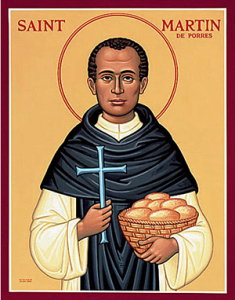 St. Martin de Porres was a mulatto, the black son of a Spanish conquistador and a freed slave woman from Panama. In 1594, he entered the Dominican monastery at Lima, Peru, and became a professed brother in 1603. Martin was trained as a physician, but he also possessed gifts of healing. So he turned the monastery into a dispensary, a ramshackle prototype of a modern clinic.
St. Martin de Porres was a mulatto, the black son of a Spanish conquistador and a freed slave woman from Panama. In 1594, he entered the Dominican monastery at Lima, Peru, and became a professed brother in 1603. Martin was trained as a physician, but he also possessed gifts of healing. So he turned the monastery into a dispensary, a ramshackle prototype of a modern clinic.Hundreds of Lima’s poor came to him for help. With medicine or miracles, he healed the sick. At the monastery door he fed several hundred people every day. He collected money and distributed it among the needy. Once he provided dowries for twenty-seven poor young women who could not have married without his aid. And his most significant act of social justice was funding, designing, building and staffing an orphanage and school for the street children of the city.
Martin always tried to stay little, hidden in the background. For example, he attempted to conceal his healing gift by using some herb or poultice as a decoy when he ministered to the sick. But despite his efforts he became well-known for his healing.
An amusing story is told of Felician de Vega, who was passing through Lima to take up his office as archbishop of Mexico. He was suffering from fever and an immobilizing pain in his chest. So he sent for Brother Martin, the famous healer. The superior ordered Martin to go to the archbishop immediately, giving him no time to gather his medical paraphernalia. This time Martin wouldn’t be able to hide. When he arrived, the archbishop ordered him to extend his hand:
“But what would a prelate like Your Excellency want with the hand of a poor mulatto?” asked Martin, hoping to keep his cover.
“Didn’t the Father Provincial tell you to do whatever I said?”
“Yes, my lord.”
“Then put your hand on my chest.”
As soon as the saint touched the archbishop the pain went away. Martin tried to remove his hand. “Isn’t that enough, my lord?”
“Leave your hand right where it is,” said the archbishop, and he held the saint’s had firmly against his rib cage. Miraculously, the fever and all traces of the illness disappeared.
Embarrassed at his exposure, Martin returned to the monastery. He disciplined himself by grabbing a broom to sweep in dark corners of the building and by cleaning latrines.
“Brother Martin,” a priest asked him, “wouldn’t you be better off in the palace of the archbishop of Mexico?”
Martin answered with a paraphrase of Psalm 84: “‘I have chosen to be a slave in the house of my God.’ Father, I think one moment spent in doing what I am doing right now is more important than many days spent in the house of the Lord Archbishop.”
Such humility and charity were the hallmarks of St. Martin’s life. For half a century he was the servant of all in the monastery and the city. He died in 1659.
St. Martin de Porres was both a contemplative and an activist, setting us an example of balancing prayer and social action. Martin devoted most of his day serving others. Much of the night he sacrificed sleep to worship the Lord before a crucifix. Few of us are called to duplicate the saint exactly. But all of us should imitate him by building both prayer and social action into our busy lives. And in our own small ways, keeping them in balance as St. Martin did.
(Image Credit: St. Martin Marianists)
Read more from Bert at his website www.BertGhezzi.com, or check out his many books on Amazon.
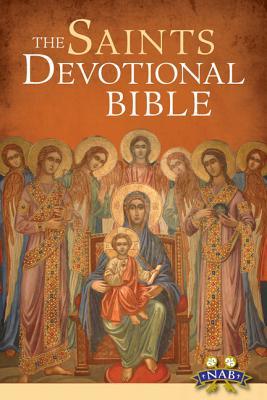
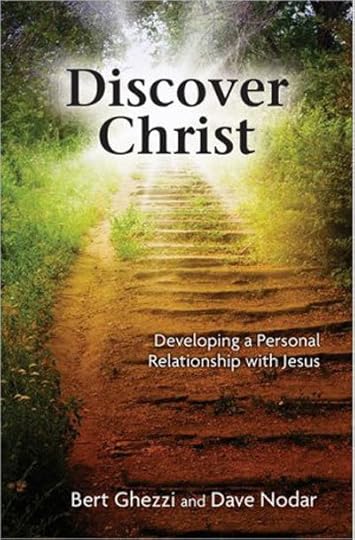
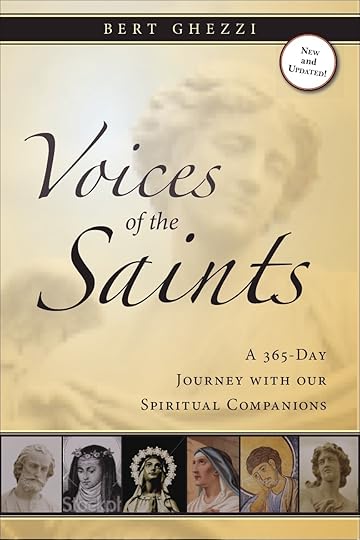
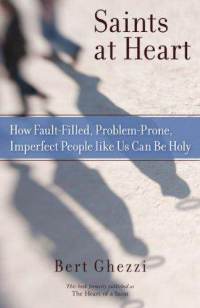
The post Learning from a Humble Social Justice Saint appeared first on Brandon Vogt.





October 31, 2014
“Would You Baptize an Extraterrestrial?” Book Giveaway!
“Find out how much God has given you and from it take what you need; the remainder is needed by others.” – St. Augustine
Since I’ve built up a large collection of extra books and resources, every week I give some away absolutely free, no strings attached. Each giveaway lasts seven days with a new one beginning every Friday. You can enter any time during the week. Check out my past giveaways here.
Thanks to Image Books, today I’m giving away TEN copies of the new Would You Baptize an Extraterrestrial?.
(If you missed it, read my interview with Brother Guy Consolmagno and Father Paul Mueller.)
Would You Baptize an Extraterrestrial?…and Other Questions from the Astronomers’ In-box at the Vatican Observatory
by Guy Consolmagno, SJ and Paul Mueller, SJ
Image Books, 304 pages, hardcover
Released on October 7, 2014
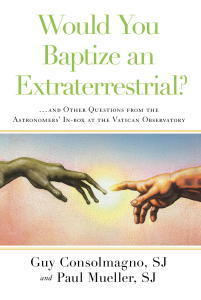 “Imagine if a Martian showed up, all big ears and big nose like a child’s drawing, and he asked to be baptized. How would you react?” – Pope Francis, May, 2014
“Imagine if a Martian showed up, all big ears and big nose like a child’s drawing, and he asked to be baptized. How would you react?” – Pope Francis, May, 2014
Pope Francis posed that question – without insisting on an answer! – to provoke deeper reflection about inclusiveness and diversity in the Church. But it’s not the first time that question has been asked.
Brother Guy Consolmagno and Father Paul Mueller hear questions like that all the time. They’re scientists at the Vatican Observatory, the official astronomical research institute of the Catholic Church. In Would You Baptize an Extraterrestrial? they explore a variety of questions at the crossroads of faith and reason: How do you reconcile the The Big Bang with Genesis? Was the Star of Bethlehem just a pious religious story or an actual description of astronomical events? What really went down between Galileo and the Catholic Church – and why do the effects of that confrontation still reverberate to this day? Will the Universe come to an end? And… could you really baptize an extraterrestrial?
With disarming humor, Brother Guy and Father Paul explore these questions and more over the course of six days of dialogue. Would You Baptize an Extraterrestrial will make you laugh, make you think, and make you reflect more deeply on science, faith, and the nature of the universe.
I’m using Rafflecopter to help with the giveaway, which is cool because it allows you multiple entries for commenting, posting on Facebook, sharing on Twitter, etc. Click below to enter:
(If you’re reading this through email or RSS and don’t see the giveaway widget, click here.)
By entering this giveaway you agree to occasionally receive email updates from me—no spam, just updates about free books, cool links, and exciting news.
The winner(s) will be randomly selected next Friday and the books will be sent out, free of charge, shortly thereafter.
In the future I’ll be giving away more books and resources, sometimes multiple items per giveaway! So subscribe via feed reader or email to ensure you never miss your chance to win.
(Since I’m covering the shipping costs, only residents within the continental United States are eligible to win.)
The post “Would You Baptize an Extraterrestrial?” Book Giveaway! appeared first on Brandon Vogt.





October 30, 2014
The Rome Experience
Another soul-stirring video from the talented Spirit Juice Studios! Whether you’ve been to Rome or simply long to visit the Eternal City, watch this film:
If you can’t see this video in your RSS reader or email, then click here.
The Rome Experience is a cultural and spiritual pilgrimage for diocesan seminarians. Founded in 2007 at the request and under the direction of the Bishops Advisory Board, the Rome Experience provides seminarians the opportunity to nurture their call in the heart of the Catholic Church, beside the Chair of St. Peter, and at the tombs of the saints and martyrs.
It is inspired by the thought and work of St. Josemaría Escrivá, founder of Opus Dei, who dedicated many years of his life to caring for the spiritual and human needs of diocesan priests, and remains a spiritual guide for many priests today. The Rome Experience is designed to complement existing programs of formation in diocesan seminaries for seminarians that have completed at least their first year of theology.
Learn more at TheRomeExperience.org.
The post The Rome Experience appeared first on Brandon Vogt.





October 29, 2014
Would You Baptize Aliens?: An Interview with Two Vatican Astronomers
Today I sit down with two Catholic scientists, Brother Guy Consolmagno, S.J. and Father Paul Mueller, S.J. Both men work for the Vatican Observatory, which is based at Castel Gandolfo, Italy. And together they wrote a new book, Would You Baptize an Extraterrestrial? and Other Questions from the Astronomers’ In-box at the Vatican Observatory (Image Books, 2014).
Brother Consolmagno is a graduate of the Massachusetts Institute of Technology, where he earned a B.A. and M.A. in planetary science. After earning a Ph.D from the University of Arizona, he taught at Harvard and MIT before eventually lading at the Vatican Observatory. There he works as the curator of the Vatican Meteorite Collection and researches the connections among meteorites, asteroids, and small bodies in the solar system. He has written more than 40 refereed scientific papers and a number of popular books, including his memoir, Brother Astronomer: Adventures of a Vatican Scientist. Earlier this year, the American Astronomical Society awarded him the Carl Sagan Award for excellence in communicating planetary science to the general public.
Brother Consolmagno is also well known for his fun appearance on The Colbert Report:
Father Mueller is a philosopher of science who serves as superior of the Jesuit community at Castel Gandolfo. He holds a B.S. in physics from Boston University, an M.A. in philosophy from Loyola University of Chicago, M.Div and S.T.M. degrees in theology from the Jesuit School of Theology at Berkeley, and a Ph.D in the philosophy of science from the University of Chicago.
BRANDON: Brother Guy, as a PhD physicist, Jesuit brother, Vatican astronomer, and Colbert Report guest, you’re a sign of contradiction. How did you end up a religious scientist? Do you find any contradiction between those two roles?
BROTHER GUY CONSOLMAGNO, SJ: I have no idea why you’d see any contradiction; I don’t. I struggle mightily to figure out what bad assumptions people are making about science and religion when they think that! I know scientists of all religious faiths, and that should be no more surprising than to say that I know religious people who have all sorts of jobs!
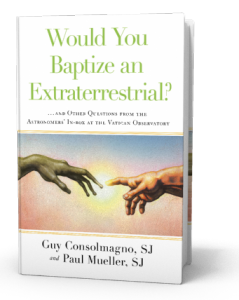 Of course my scientific training shapes the habits of thought I use when I think about God, but I also know that my way of thinking about God is neither the only way to think, nor unique just to me as a scientist. And being a person of faith obviously shapes the kinds of questions I think are fun to work on, and the way that I will go about working on them. For instance, I hate the idea of hoarding data; you learn by sharing, and learning is more important to me than getting a career edge on some scientific rival.
Of course my scientific training shapes the habits of thought I use when I think about God, but I also know that my way of thinking about God is neither the only way to think, nor unique just to me as a scientist. And being a person of faith obviously shapes the kinds of questions I think are fun to work on, and the way that I will go about working on them. For instance, I hate the idea of hoarding data; you learn by sharing, and learning is more important to me than getting a career edge on some scientific rival.
I think the big mistake behind the question is thinking that science and religion are rival sets of “things” that must be “believed.” “What do I do, if science tells me one thing but religion tells me another thing? Which do I believe?”
There’s a false assumption at the center of that question—because neither science nor religion are about “believing” in “things”. But my religious belief is not in a “thing,” but in a Person—indeed, Three Persons…the Father, Son, and Spirit as described and identified in the Creed, and in the Church that leads us to those Persons. And science is not about the “things” we call data points, but in the description we come up with to describe how those “things” work. The data points stay the same, but the description changes as science changes.
BRANDON: Fr. Georges Lemaître (1894-1966), a Belgian cosmologist and Catholic priest, is widely considered the father of the Big Bang theory, which he introduced in 1927. Today it’s the most widely accepted theory for the origin of the universe. However, Fr. Lemaître and Pope Pius XII disagreed on the theory’s implications for a Creator God. What’s the significance of the Big Bang and does it provide support for a Creator?
BROTHER CONSOLMAGNO: Lemaitre himself was adamant that his theory was a nice description based on the mathematics of Relativity and the observations of Hubble, but it should never be taken as a last word… much less something infallible on which one could base one’s faith. And in fact, following their conversation, it’s pretty clear that he convinced Pope Pius XII of this, as well. I would turn the relationship between Big Bang and Creator around…and suggest that belief in a Creator God, who is “The Word”—the Logos…Logic…Reason—provides support for the idea that we ought to be able to understand Creation in terms of a rational, mathematical theory like the Big Bang.
BRANDON: Back in 2006, the International Astronomical Union downgraded Pluto from planet to “dwarf planet.” In the book you note the special role the Vatican played in this decision. How was the Church involved?
BROTHER CONSOLMAGNO: We were astronomers among our fellow astronomers who debated the point. As it happened, I was on one of the (several) commissions that was involved in the discussion, and Fr. Corbally was on the committee that wrote the final resolution voted on by the IAU. But the whole topic is interesting for another reason: it reminds us that “science” is not eternal, and we shouldn’t be surprised when it changes its mind in the face of new data. That’s one reason why science is not a good foundation for religious belief.
BRANDON:In May 2014, Pope Francis said, “Imagine if a Martian showed up, all big ears and big nose like a child’s drawing, and he asked to be baptized. How would you react?” What would your response be?
BROTHER CONSOLMAGNO: I’d want to be sure they really knew what they were asking for! How could you tell? Well…are they willing to share a meal with me? To help me out if I am hurt, at the side of the road? To offer their life for me? And would I be willing to do likewise?
FATHER PAUL MUELLER, SJ: Let’s not forget that Pope Francis was mainly making a point about humans, not about Martians. He was talking about how the early Church struggled over the question of whether non-Jews could be admitted to baptism. The early Jewish-Christians saw themselves as God’s Chosen People, and saw in Jesus the Messiah who God had promised would save them. They had difficulty imagining how that salvation could be extended to non-Jews. But in the end the Church decided that all people were chosen by God, and that baptism could be extended to all. So I think that the Pope’s question was mainly about us and how we see ourselves as chosen by God, rather than about Martians.
BRANDON: You spend several pages in the book on the Galileo affair. What really happened? Could the dispute have been avoided?
BROTHER CONSOLMAGNO: History is made by individuals; individuals could always make different decisions. What happened to Galileo and all the other people in that time and place was the result of the times and the politics and the fears and the hopes of all those individuals. It’s not surprising that it happened; but it wasn’t necessarily inevitable.
FATHER MUELLER: What really happened with Galileo is a long and complex story—read our book! But our book can get at only some aspects of the story. Of course the dispute could have been avoided, or could have gone differently. History is contingent, after all. And while we’re at it, the subsequent history of interpretation of the Galileo story also could have gone differently—it didn’t have to be interpreted as a great symbol of conflict between faith and science.
BRANDON: Suppose you had one minute to explain to an atheist how “the heavens declare the glory of God.” What would you say?
BROTHER CONSOLMAGNO: Go outside and look for yourself! If there’s not a God they are praising, there ought to be!
FATHER MUELLER: You can see the lunch that your wife packs for you just as lunch, or as an expression of the love which she has for you. You can see the stars in heaven just as stars, or as an expression of the Love which God is. For those who believe in the God, who is Love and who is ultimate Creator of being and order, the glory of God is declared not just by the heavens but by everything else that exists: by pebbles, earthworms, and trout scales; by hornet nests, finches’ wings, and hockey players; and yes, by atheists too.
The post Would You Baptize Aliens?: An Interview with Two Vatican Astronomers appeared first on Brandon Vogt.





October 28, 2014
The Most Powerful Pro-Life Film of the Year (Watch Until the End!)
The last few years have seen a number of pro-life films, both feature-length and short, but I think “Crescendo” stands at the top. This stunning 15-minute work has received global acclaim and has won over 11 international awards.
It revolves around an 18th-century woman in distress who, while pregnant, tries to take her own life, only to reverse course through some unexpected twists. It was produced by the same team behind “Bella”, another celebrated pro-life film, and aims to raise $10 million for crisis pregnancy centers around the world.
Take 15 minutes today and watch “Crescendo” below:
If you can’t see this video in your RSS reader or email, then click here.
Interestingly, one of the film’s executive producers is Pattie Mallette, better known as the mother of pop superstar Justin Bieber. Mallette felt personally connected to the film’s message since she gave birth to her now-famous son while unmarried and after being pressured to terminate the pregnancy.
“My hope has always been to tell my story to help young women because I can relate,” she says. During her pregnancy, she was, “relatively alone, scared and unprepared” until a crisis pregnancy center took her in, “and gave me the help I needed.”
“I don’t know where we would be without that center,” Mallette says, adding, “I would hope that anyone, whether for or against abortion, would always want any young woman who may need a place to be cared for, loved and helped, to have what she would need.”
Learn more about the film, including how to host your own screening or order the DVD, at CPMovie.com.
The post The Most Powerful Pro-Life Film of the Year (Watch Until the End!) appeared first on Brandon Vogt.





October 27, 2014
All Roads: Roamin’ Catholic Apologetics [Book]




All Roads: Roamin’ Catholic Apologetics by Dale Ahlquist (ANC Books, 2014)


Dale Ahlquist describes G.K. Chesterton as ‘The Complete Thinker,’ someone who ties together disparate ideas into a marvelous whole. Chesterton would return the compliment after reading All Roads . In this witty and delightful apologetic, Ahlquist weaves the tapestry of Catholic teaching with joy, verve, and fresh insight, connecting all the individual strands. Where are Chesterton’s successors today? Read this book and you’ll find one of them.
The post All Roads: Roamin’ Catholic Apologetics [Book] appeared first on Brandon Vogt.





October 24, 2014
“Catholic Literary Giants” Book Giveaway!
“Find out how much God has given you and from it take what you need; the remainder is needed by others.” – St. Augustine
Since I’ve built up a large collection of extra books and resources, every week I give some away absolutely free, no strings attached. Each giveaway lasts seven days with a new one beginning every Friday. You can enter any time during the week. Check out my past giveaways here.
Thanks to Ignatius Press, today I’m giving away FIVE copies of Joseph Pearce’s excellent book, The American Catholic Almanac.
Catholic Literary Giants: A Field Guide to the Catholic Literary Landscape
by Joseph Pearce
Ignatius Press, 425 pages, hardcover
Released on October 7, 2014
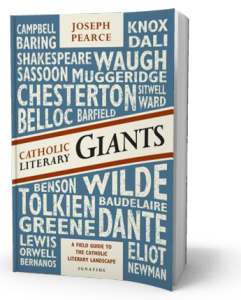 In Catholic Literary Giants, Joseph Pearce takes the reader on a dazzling tour of the creative landscape of Catholic prose and poetry. Covering the vast and impressive terrain from Dante to Tolkien, from Shakespeare to Waugh, this book is an immersion into the spiritual depths of the Catholic literary tradition with one of today’s premier literary biographers as our guide.
In Catholic Literary Giants, Joseph Pearce takes the reader on a dazzling tour of the creative landscape of Catholic prose and poetry. Covering the vast and impressive terrain from Dante to Tolkien, from Shakespeare to Waugh, this book is an immersion into the spiritual depths of the Catholic literary tradition with one of today’s premier literary biographers as our guide.
Focusing especially on the literary revival of the twentieth century, Pearce explores well-known authors such as G.K. Chesterton, Graham Greene and J.R.R. Tolkien, while introducing lesser-known writers Roy Campbell, Maurice Baring, Owen Barfield and others. He even includes the new saint, Pope John Paul II, who wrote many literary and poetic pieces, among them the story that was made into a feature film, The Jeweler’s Shop.
I’m using Rafflecopter to help with the giveaway, which is cool because it allows you multiple entries for commenting, posting on Facebook, sharing on Twitter, etc. Click below to enter:
(If you’re reading this through email or RSS and don’t see the giveaway widget, click here.)
By entering this giveaway you agree to occasionally receive email updates from me—no spam, just updates about free books, cool links, and exciting news.
The winner(s) will be randomly selected next Friday and the books will be sent out, free of charge, shortly thereafter.
In the future I’ll be giving away more books and resources, sometimes multiple items per giveaway! So subscribe via feed reader or email to ensure you never miss your chance to win.
(Since I’m covering the shipping costs, only residents within the continental United States are eligible to win.)
The post “Catholic Literary Giants” Book Giveaway! appeared first on Brandon Vogt.





October 22, 2014
Diary of a Vatican Priest: An Interview with Msgr. Richard Soseman
George Bernanos’ Diary of a Country Priest has become a Catholic classic, and rightfully so, for its moving account a young French priest who experiences deep struggle, joy, and wonder through his service of a country people.
Thanks to Monsignor Richard Soseman, we now have a similar glimpse at the life of different sort of priest. His new memoir, Reflections from Rome: Practical Thoughts on Faith and Family, takes us from the fields of Princeville, Illinois to the majestic splendor of Rome, revealing the comings and goings of life as a priest in the Eternal City.
Msgr. Soseman currently serves as an Official for the Congregation for the Clergy and is also Judge for the Cause of Venerable Fulton Sheen. He recently chatted with me about his upbringing, his life in Rome, and his prolific blogging.
BRANDON: In Reflections from Rome, you share many uplifting anecdotes about your family. How has your family supported your vocation to the priesthood?
MSGR. RICHARD SOSEMAN: When a couple marries they each bring the best of their own families, their background, gifts and talents, and life experience, to make to each other, and to their eventual children, a sincere gift of self.
My father was a man of great faith. He put this faith into action by his commitment of time and money to good causes. He was a very talkative man, who would listen to anyone. When he disagreed with someone, he did so in a pleasant, positive way. We used to think we were a very helpful family, because long after parish dinners and events, we would be there sweeping up and putting away tables and chairs. I realized as an adult, that probably, all the while, Dad was talking, so we kids found things to do in the meantime.
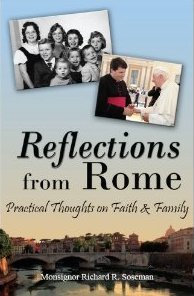 My mother is more quiet, but very wise, and she, to this day, loves children. She was on the point of entering the Benedictine nuns years ago, when her father refused, saying she loved children too much. I was the youngest of 8, and there were very few moments in our lives when there was not some activity which would help us grow and develop, some constructive play activity, or even gardening, which had the practical side effect, too, of helping to feed 10 mouths through the year.
My mother is more quiet, but very wise, and she, to this day, loves children. She was on the point of entering the Benedictine nuns years ago, when her father refused, saying she loved children too much. I was the youngest of 8, and there were very few moments in our lives when there was not some activity which would help us grow and develop, some constructive play activity, or even gardening, which had the practical side effect, too, of helping to feed 10 mouths through the year.
We were also a devout family, with Mass attendance on Sunday, and sometimes during the week, and occasions of family devotions such as the Rosary. Each morning we prayed the Morning Offering as we prepared for school, and shows such as the early morning Sacred Heart program were often on television. On May 1st we would make May Baskets to hang, secretly, on the doors of neighbor ladies, and would build a May Altar where we could pray in the home during the month of Mary. I also remember some Rosary devotions during October.
My parents were also much given to community service, and I would often be taken along with my father, even as a small boy, to his meetings. Dad was a precinct committeeman and member of the Welfare Board when I was very small, part of our Youth Center Board, a blood donor, who also collected for the Heart, and Lung, Associations. Mom became a visiting nurse when I was in grade school, and would sometimes take me along while she looked in on her old people. Her insistence, I remember, was always that we learn to do things on our own, so we could do them as adults. So when my brother or I wanted chocolate chip cookies, we asked if we could make some. When filling out financial aid forms for college, we did that, asking our parents for the figures, of course.
I suppose this is a long way of saying that the family is the seedbed of vocations, and many vocations spring from normal, healthy, devout families and the family experiences young men and women have. As I was growing, I knew that priesthood was a possibility, but I also knew being a good layman was a possibility. When I decided to look into the possibility of seminary, of a vocation, my parents were supportive that I discover a vocation, or whatever else God might have in store. As a priest, I am supported in very powerful ways by the prayers and encouragement of each of my brothers and sisters, nieces and nephews, and they can still straighten me out if I am perceived to need a “talking to.” So, this ongoing support in living out my vocation is also important and helpful.
BRANDON: As a priest, you began your ministry in Princeville, Illinois, a small rural town. What were some of your most memorable experiences??
MSGR. SOSEMAN: When I was ordained, my first assignment was at St. Mary’s in Moline, Illinois, quite close to home. After a few months, I was left alone at the parish, and needed to run things for the rest of that year. People were kind, encouraging and supportive. It was there that I learned that a priest needs to be available to people. St. Mary’s is an old parish, with a large immigrant presence. It was inspiration to see the great example of our senior citizens. Two elderly gentlemen would set up for and serve Mass every morning, and taught me about as much as they learned from me. The “Heavenly Dusters” would gather in Church early every Friday, long before the morning Mass, and clean EVERYTHING, even all of the holy water stoups. They loved our Lord, they loved their church, and they came together each week to make sure that it was immaculate for Sunday Mass.
Six years after ordination, I was named pastor of St. Mary of the Woods Parish in Princeville, Illinois, a small town halfway between Peoria and Kewanee, Illinois. Six months after I arrived, I was incapacitated by an accident, and confined to a wheelchair. I learned then the overwhelming generosity of people when they are called upon to help. My mother came to stay with me and to care for me, parishioners would bring suppers every night of the week, always their specialties, and also would come by two or three times a day to help me move around the house. A wheelchair ramp was installed overnight. At Mass times, I would be loaded into a wheelchair and wheeled over to Church for Confessions or Mass. It was moving to see the devotion that our people had for the priesthood, and this poor priest. I should add that throughout my ten years there, I worked hard at explaining my vision for the parish, and the people were always very supportive. I also had several other irons in the fire, serving most of that time as Judicial Vicar and Judge of the Sheen Cause, but the people never complained about any of my absences from the parish to do this “other work” which was given to me.
Living in the country provided some unique experiences. I was able to hop on my bicycle, and be out on the many country roads in a matter of minutes. I discovered the quiet beauty of the fields at different times of the year, of sunrise over the prairie and of the woodland birds and flowers. September was interesting, for there was a pasture within “hearing” distance of the rectory, and in September the calves were weaned from the cows. My goodness, what a racket, day and night, for a few days. The shut-ins I would visit would often give some worldly wisdom, built up from long experience, from topics as how to properly wean calves so they don’t make such a racket, insights into others whom they had known for a lifetime, and beautiful reflections about God’s actions in their lives over the years. God is so good.
We would have adoration of the Blessed Sacrament, throughout the day, on many first Saturdays. Attendance could be a bit spotty. One month, for a special occasion, we decided to have overnight adoration from Friday through Saturday morning. I remember going over for prayer at 3 a.m., and 10 people were there! It turns out that Saturday, daytime, was often the time for running weekly errands, for “going to town,” for groceries and supplies, etc., while overnight was much more convenient for many parishioners. There was so much to learn.
One hears so much about these “mega churches,” amongst the Protestants and seekers, and some dioceses are reorganized to merge parishes into new “mega parishes” which they hope might provide many services. This type of thrust overlooks the great goodness which is part of rural parish, or other small parish life. I can say that my parish experience in Princeville, a rural parish, made me a better priest.
BRANDON: You later moved to Rome to begin work with the Congregation for the Clergy. How has the Eternal City shaped your spiritual life?
MSGR. SOSEMAN: Of course, it is an experience almost beyond description to live in a city shaped by so many martyrs and saints over the centuries. It is wonderful to be able to read about the different churches and other sites in the city of Rome, and then to visit those places, knowledgeable of those who have pioneered the faith here and throughout the world.
For the last few years I have been celebrating Holy Mass daily at St. Peter’s Basilica. To be in the center of our faith every day for early morning Mass is a very moving experience. For a few years I have let online friends, family, and contacts, know that I would be remembering their prayer requests at Holy Mass at St. Peter’s on Fridays. Each week I receive an outpouring of prayer requests, some weeks more than 100. Ven. Fulton Sheen said that when a priest approaches the altar, all of his parishioners are dangling from his vestments. I have come to this realization most fully as I read through these requests for prayers every Thursday night and Friday morning in preparation for Mass, and then again call them to mind during the Mass.
BRANDON: One thing I appreciate in your reflections is your emphasis on finding God in the ordinary. How can we do that better?
MSGR. SOSEMAN: I was once invited to moderate one meeting of a charismatic prayer group online, in the early years of the internet. We got into a discussion of St. Thérèse, the Little Flower’s practice of “doing the ordinary, extraordinarily well,” as a way to follow Jesus’ footsteps, and what that would mean in everyday life. A mother who was participating typed in something like “when I bring my son his bowl of cereal in the morning, I could just put it on the table in front of him, or I could put it in front of him and lean over and kiss him on the forehead,” and she asked if that would be an example. “Certainly,” the reply came. Our Lord has given us each unique gifts and talents, and as we strive to stay close to him throughout the day, we try to put those to the best use. So, a mother excelling in some small way with her children, a mechanic who avoids swearing when he mashes his hand, an artist who makes just the right brush stroke, and looks up and says “thank you Lord,” these are all ways in which we can find God in the ordinary.
We must never forget the four ends of prayer. We are all familiar with petition, asking God for things, but we often forget thanksgiving, thanking him for what he has given to us. Most of us do that at grace at mealtimes, but anytime during the day we accomplish something unexpected, we can certainly thank our Lord. We can also, so often during the day, make reparation to our Lord. By this third end of prayer we strive to offer ourselves to God to try to make up for our own sins and the sins of others. This can be done through the day by praying the Divine Praises, or by pious sayings or ejaculations, perhaps one of the lines from the Divine Praises or even “My Jesus, mercy!” Our penances can also be offered in reparation. St. Francis de Sales encouraged us to do little penances throughout the day which no one would notice, like giving up salting a food at a meal. Small, daily actions of love like this can be offered as prayers of reparation. The final end of prayer, of course, is adoration, kneeling before the mystery of God in prayers, placing ourselves in his hands, realizing his majesty, and our utter dependence upon him. We should try to do this more often.
Our lives are so different, it is hard to come up with a one size fits all answer, but these, hopefully, will start the reader thinking in the right direction!
BRANDON: Many of these reflections are adapted from blog posts you made. Why did you start blogging? Do you recommend other priests start blogs of their own?
MSGR. SOSEMAN: When secular writers write about faith, it is usually that it is diminishing, that fewer people are going to Church, for instance, or that only megachurches are growing because they are “with it.” Many people of more recent generations don’t have the building blocks to understand faith, they were never catechized fully, so they don’t even know how to begin. Others feel distanced or alienated from God and His Church because, in their humility, they feel unworthy to approach him. They believe that they are distant from him but don’t quite understand how. Some have bought into any of the hundreds of myths about the Church, which they hear and see every day in their use of the media. Still others may feel distanced because they understand the Church as being anti woman, homophobic, too political, or even worse. Some of us can even feel distant from the Church because of a bad experience with a priest, nun, or zealous lay person.
In my priesthood I have really seen that there is such hunger for the faith in the world, there is such a desire to know God, despite all of these barriers that have been set up by society, or by one’s own conscience. I believe I have always tried to get people to look beyond all of those barriers, trusting in the Holy Spirit to lead them through to a greater relationship with God. Blogging is just one way to do that. The reflections which I post are meant to catch people’s attention or interest, with some story from family life, the saints, Church history, or something humorous from Rome or home, and then relate that to an application in living the faith. I hope to help people to cut through their doubts, to overcome any barriers which might be in the way, to come closer to God.
Over the years I have also been involved in sports sites, and write essays for them too. Most of those are much less faith centered. On a cycling site I publish daily essays during the Tour de France and other Grand Tours. These deal with the history, culture, or literature of that portion of Spain, or France, or Italy, through which the race is passing that day, or occasionally food or wine. I am conscious not to avoid mention of faith, of course, as I am who I am through the grace of God. Recently, the moderators of the site put up a post from a gentleman saying that through my daily essays on cycling, he had come back to the Church of his childhood (he then went on to credit Pope Francis, too).
So, I have some talents in writing, I have some time I can dedicate to it, and I want to use this writing for the greater glory of God and the salvation of souls.
I would encourage any priest, any time, anywhere, to use the modern media in his own ministry. The need is so great! A good friend and diocesan brother priest of mine has a parishioner who asked if she could record his sermons, and now those are posted online. The twelve apostles were chosen by Our Lord because of their strengths, but also because of their weakness, because they were able to reach out to others in their own unique ways. Some priests are bookish, some have quick tempers or great senses of humor, some are known for being more strict, others for loving sports or fine foods and wine. All these faithful priests have tools whose uniqueness means can reach unique people.
So, in addition to the wonderful and fruitful efforts of the laity to spread the faith using the new media, I pray many priests will become involved, employing their own gifts and talents and reaching out to the souls that they can reach best.
The post Diary of a Vatican Priest: An Interview with Msgr. Richard Soseman appeared first on Brandon Vogt.





Brandon Vogt's Blog
- Brandon Vogt's profile
- 75 followers


